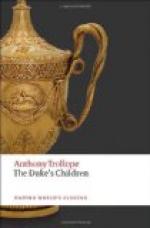Between two and three o’clock Lord Silverbridge, in spite of his sorrow, found himself able to eat his lunch at his club. The place was deserted, the Beargarden world having gone to the races. As he sat eating cold lamb and drinking soda-and-brandy he did confirm himself in certain modified resolutions, which might be more probably kept than those sterner laws of absolute renunciation to which he had thought of pledging himself in his half-starved morning condition. His father had spoken in very strong language against racing,—saying that those who went were either fools or rascals. He was sure this was exaggerated. Half the House of Lords and two-thirds of the House of Commons were to be seen at the Derby; but no doubt there were many rascals and fools, and he could not associate with the legislators without finding himself among the fools and rascals. He would,—and as soon as he could,— separate himself from the Major. And he would not bet. It was on that side of the sport that the rascals and the fools showed themselves. Of what service could betting be to him whom Providence had provided with all things wanted to make life pleasant? As to the drag, his father had in a certain measure approved of that, and he would keep the drag, as he must have some relaxation. But his great effort of all should be made in the House of Commons. He would endeavour to make his father perceive that he had appreciated that letter. He would always be in the House soon after four, and would remain there,—or, if possible, as long as the Speaker sat in the chair. He had already begun to feel that there was a difficulty in keeping his seat upon those benches. The half-hours there would be so much longer than elsewhere! An irresistible desire of sauntering out would come upon him. There were men the very sound of whose voices was already odious to him. There had come upon him a feeling in regard to certain orators, that when once they had begun there was no reason why they should ever stop. Words of some sort were always forthcoming, like spiders’ webs. He did not think that he could learn to take a pleasure in sitting in the House; but he hoped that he might be man enough to do it, though it was not pleasant. He would begin today, instead of going to the Oaks.
But before he went to the House he would see Lady Mabel Grex. And here it may be well to state that in making his resolutions as to a better life, he had considered much whether it would not be well for him to take a wife. His father had once told him that when he married, the house in Carlton Terrace should be his own. ’I will be a lodger if you will have me,’ said the Duke; ’or if your wife should not like that, I will find a lodging elsewhere.’ This had been the sadness and tenderness which had immediately followed the death of the Duchess. Marriage would steady him. Were he a married man, Tifto would of course disappear. Upon the whole he thought it would be good that should marry. And, if so, who could be so nice as Lady Mabel? That his father would be contented with Lady Mab, he was inclined to believe. There was no better blood in England. And Lady Mabel was known to be clever, beautiful, and, in her peculiar circumstances, very wise.




